Bangladesh war crimes trial: Key accused
- Published
A controversial tribunal in Bangladesh has been investigating war crimes committed during the 1971 war of independence from Pakistan. BBC News profiles the main defendants.
Ghulam Azam - died in custody
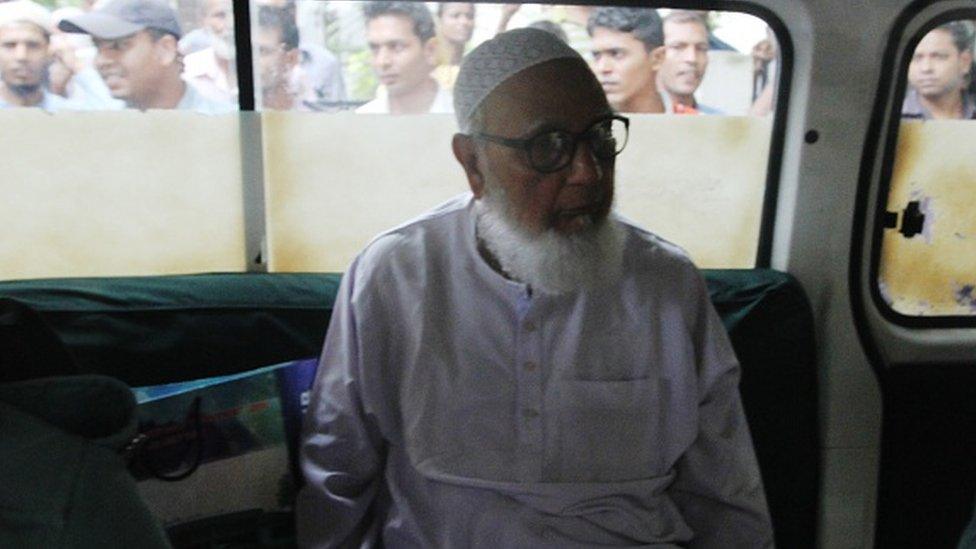
Mr Azam's supporters revered him as a scholar, but critics viewed him as a traitor
The former leader of Jamaat-e-Islami, Bangladesh's largest Islamist party, was sentenced to 90 years in jail for crimes against humanity on 15 July 2013.
Ghulam Azam, who was in his 90s, was the party's leader until 2000 when he retired from active politics. He died in October 2014 while an appeal against his conviction was pending.
He had denied all the charges against him, which included genocide, murder, abduction and arson.
Azam is alleged to have created and led pro-Pakistan militias which carried out numerous murders and rapes during the nine-month war.
Described by his party colleagues as a writer and Islamic thinker, Azam was strongly opposed to Bangladesh's independence from Pakistan, arguing at the time that it would divide the Muslim community.
He also cautioned that an independent Bangladesh would come under the political and economic influence of neighbouring India.
Azam's supporters say he was widely respected across the Muslim world. But his detractors - mainly in the governing Awami League party - saw him as a traitor.
In 1973, the government cancelled his citizenship for allegedly co-operating with Pakistani forces during the independence war.
Azam lived as an exile in Pakistan and the UK but returned to Bangladesh in 1978 when the country was led by Gen Ziaur Rahman - the assassinated husband of the country's current opposition leader Khaleda Zia.
The Supreme Court restored his citizenship in 1994.
Motiur Rahman Nizami - executed in May 2016
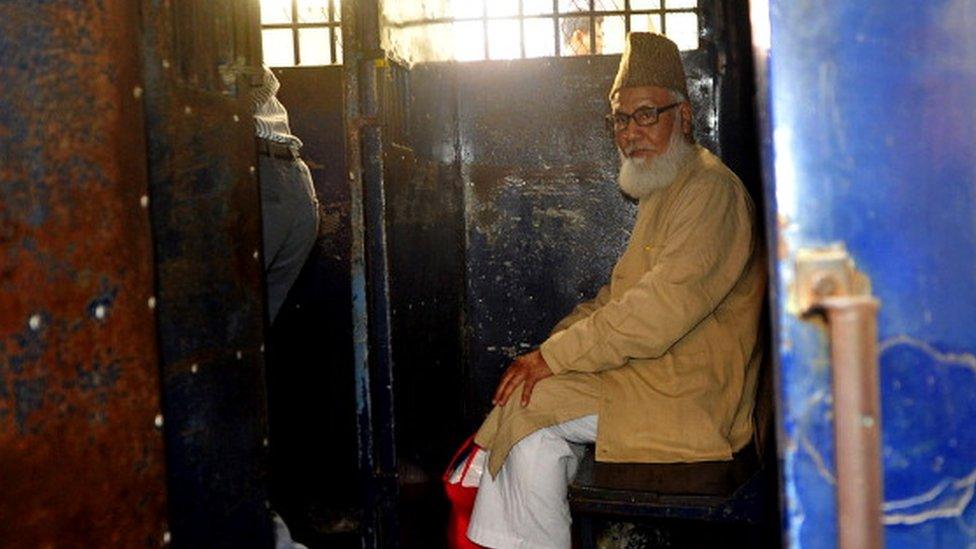
Nizami had campaigned vociferously against independence
Nizami, who led Jamaat-e-Islami, was hanged in Dhaka's prison early on 11 May after refusing to seek mercy from Bangladesh's president.
He was sentenced to death for war crimes in October 2014. The Supreme Court rejected his final appeal on 5 May 2016.
Motiur Rahman Nizami, 73, faced 16 charges including genocide, murder, torture and rape. Nizami, born in 1943, had been an active supporter of the party since he was a student.
At the time of the 1971 war, he was president of Islami Chhatra Sangha, then the party's student wing, and vociferously campaigned against the division of Pakistan.
He was accused of setting up the al-Badr group, an auxiliary force that helped the Pakistani army identify and kill pro-independence Bengali activists.
Nizami, a Dhaka University graduate, was twice elected to the Bangladeshi parliament, serving as a minister in the government led by the Bangladesh Nationalist Party (BNP) between 2001 and 2006.
He had described the accusations against him as "the worst falsehood in history".
His supporters consider him to have been a competent and honest minister and an authority on Islamic teaching. They say he was widely respected in the Muslim world. Nizami wrote about 20 books, mostly on Islam.
In 2009, he was judged to be among the top 50 most influential Muslims by an American Islamic think-tank.
Mir Quasem Ali - executed in September 2016
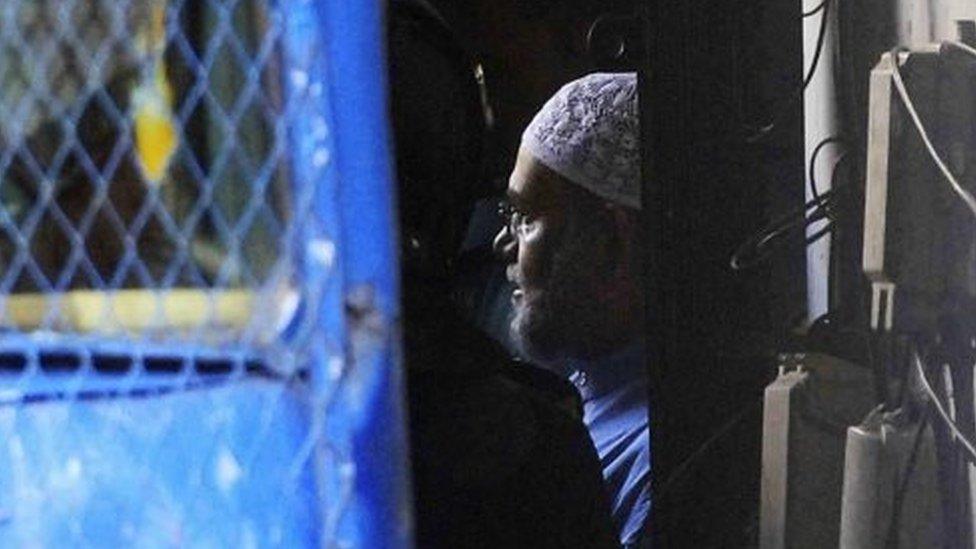
A leader and financial backer of the Jamaat-e-Islami party, he was sentenced to death in 2014 for offences including murder and torture during the war with Pakistan.
The tycoon, 63, was hanged at a high-security prison outside Dhaka.
He declined to seek a presidential pardon, which would have required an admission of guilt.
At his trial, Mir Quasem Ali was accused of involvement in a "reign of terror" in the city of Chittagong. He was found guilty of eight of the 14 charges he faced.
Delwar Hossain Sayeedi - sentenced to life in jail
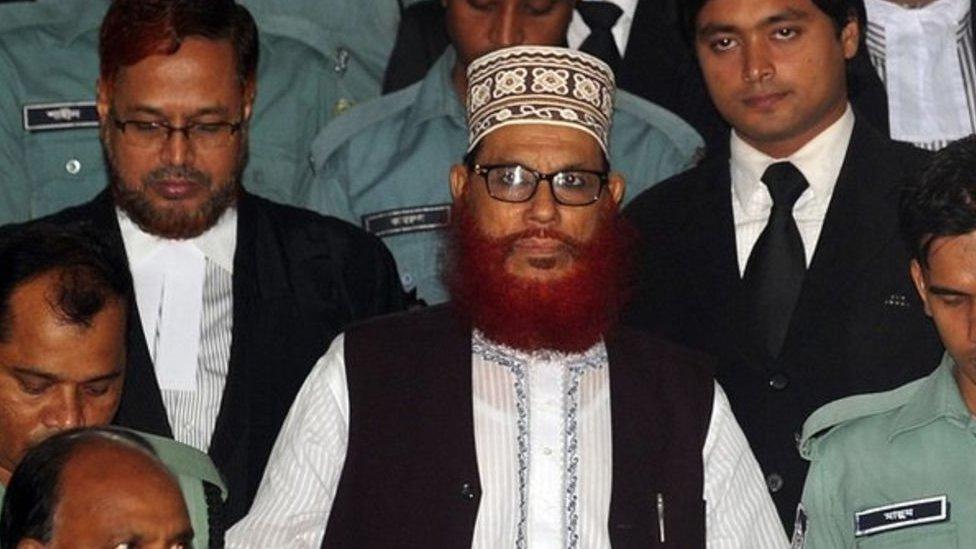
Sayeedi has previously travelled to the US and Europe to give lectures on the Koran
A prolific speaker and a well-known leader of the Jamaat-e-Islami, the 72-year-old former MP had his death sentence overturned on appeal and is now serving life in jail.
He was found guilty in February 2013 of charges including murder, torture and rape.
Arrested in June 2010, he was the first suspect to be indicted by the tribunal in 2011.
State prosecutors accused him of working with the al-Badr group during the independence struggle and of carrying out numerous atrocities, including forcibly converting Hindus to Islam.
His critics say that during the war he formed a small group to loot and seize the property of Bengali Hindus and those who supported independence.
He denied all the allegations and after he was convicted there were widespread protests across Dhaka.
Sayeedi's supporters say that - like many of his co-accused - he is an Islamic scholar and a conscientious member of various social organisations.
He has travelled to the US and Europe to give lectures on the Koran and has written books on interpreting Islam.
Some British MPs opposed his visit to the UK in 2006 because of his alleged extreme views, particularly his comments against the US and British role in Afghanistan and Iraq.
Ali Ahsan Mohammad Mujahid - executed in November 2015
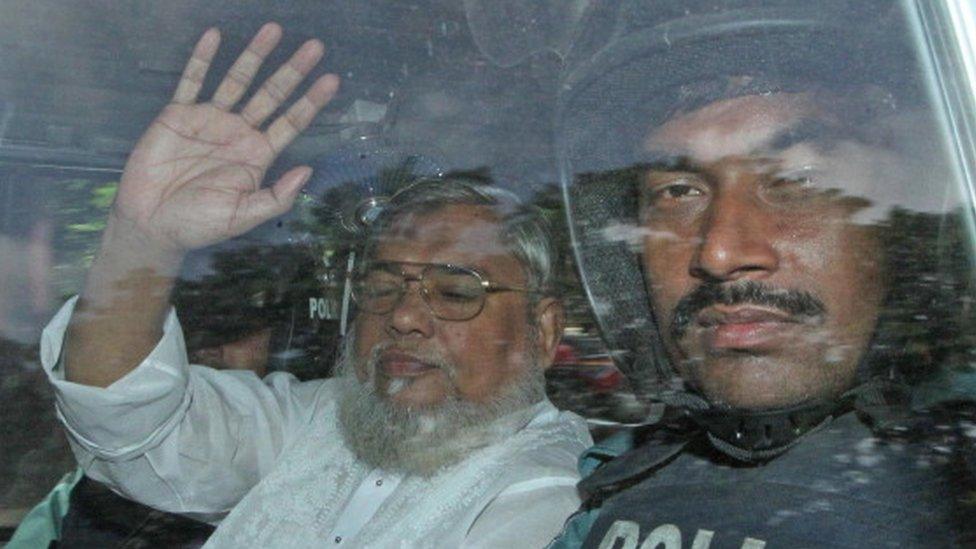
Ali Ahsan Mohammad Mujahid was regarded for his oratory
Ali Ahsan Mohammad Mujahid, 64, was the secretary-general of Jamaat-e-Islami and an influential figure within the party. He was executed in November 2015 after being sentenced to death in July 2013 - a decision that was upheld in June 2015 when the Supreme Court rejected his appeal.
He was highly regarded for his organisational skills and oratory. He was social welfare minister in the BNP-led government from 2001-2006. A student leader in 1971, he was among those who supported Bangladesh remaining part of Pakistan.
His critics say he was also an al-Badr leader responsible for the killings of a number of pro-independence Bangladeshi leaders and intellectuals.
He strongly denied the allegations but the tribunal found him guilty of five charges, including abduction and murder.
Like many other Jamaat leaders he went into hiding soon after independence, but resurfaced after Gen Ziaur Rahman came to power in a military coup in 1977.
His supporters say his trial was nothing but a political vendetta by the ruling Awami League.
They also say he was a successful minister known for his honesty and integrity.
Salahuddin Quader Chowdhury - executed in November 2015
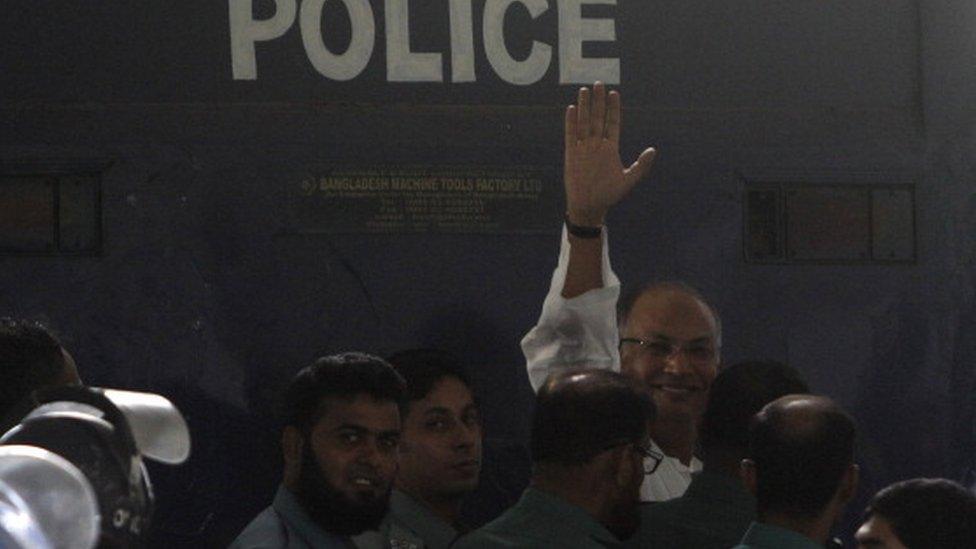
Salahuddin Chowdhury was convicted of genocide and murder
A former minister, Salahuddin Quader Chowdhury was a BNP MP and the most senior leader from the party to be sentenced for crimes against humanity. He was executed in November 2015 after the Supreme Court rejected his appeal in June 2015.
Better known as Saqa, he was the eldest son of the late Muslim League and Chittagong-based leader Fazlul Quader Chowdhury and a member of the BNP's main policymaking body.
His father was the speaker of the National Assembly of undivided Pakistan in 1965 and campaigned for a united Pakistan.
The tribunal found him guilty of nine out of 23 charges including genocide, arson and persecuting people on religious and political grounds.
He was also accused of forcefully converting a number of Hindus to Islam.
The prosecution said that his father's residence in Chittagong was turned into a torture cell during the war. Chowdhury denied all the charges and the BNP - which did not exist at the time of the war - described his trial as a political vendetta.
Chowdhury complained at the time of his conviction that the verdict had come "from the [law] ministry", saying it had been made available on the internet before it was formally announced in court.
Chowdhury's family alleged he was tortured while in custody. The authorities rejected the allegations.
Muhammad Kamaruzzaman - executed in April 2015
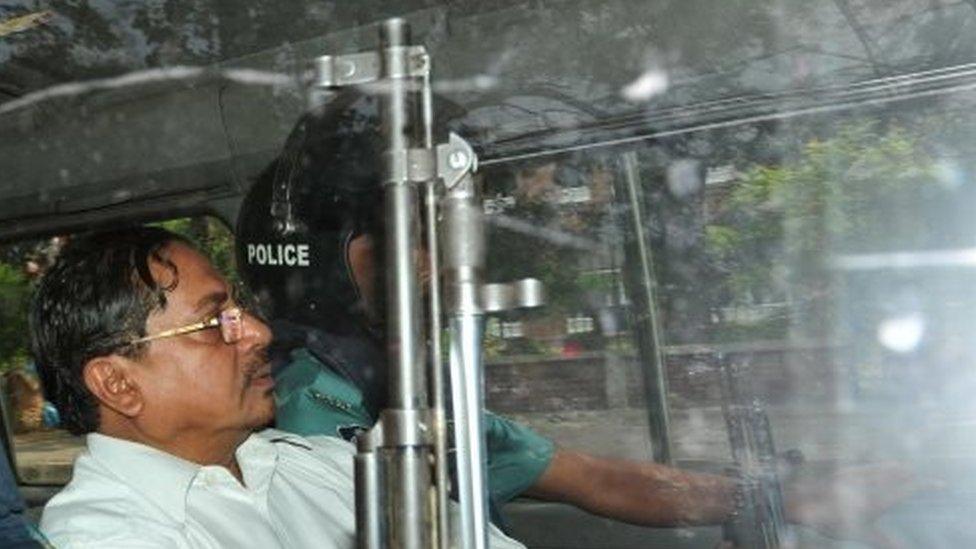
Kamaruzzaman's lawyers said he did not receive a fair trail
The assistant secretary-general of Jamaat-e-Islami was found guilty in May 2013 of masterminding what the prosecution described as one of the bloodiest single episodes in the independence war.
The Supreme Court later upheld his death sentence on appeal and he was hanged in April 2015.
The war crimes tribunal heard that he played a prominent role alongside Pakistani troops in the "slaughter" of at least 120 unarmed farmers in the remote northern village of Sohagpur which subsequently became known as the "village of widows".
Three women widowed as a result of the killings testified against Kamaruzzaman during his trial. They described how he led Pakistani troops to the village and helped the soldiers to line up and execute the farmers.
Kamaruzzaman was found guilty on five out of seven charges of crimes against humanity, including the murder and torture of unarmed civilians. His lawyers insisted that he did not receive a fair trial.
Working as a journalist after independence, Kamaruzzaman tried on several occasions to become an MP but was unsuccessful in each attempt.
Abdul Kader Mullah - executed in December 2013
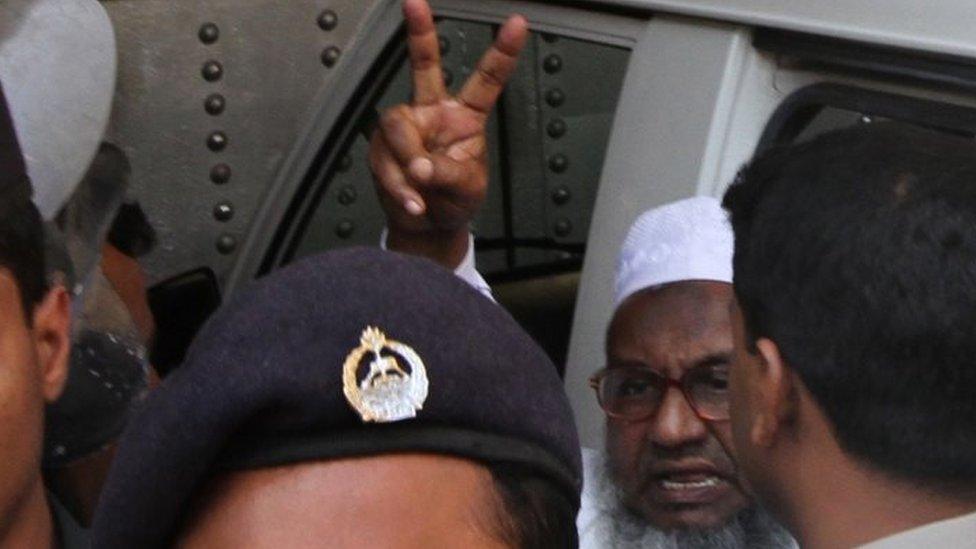
Abdul Kader Mullah was convicted in February 2013 and hanged the following December
Abdul Kader Mullah, assistant secretary general of the Jamaat-e-Islami party since 2010 and a former executive editor of The Daily Sangram, was found guilty on five of six counts of crimes against humanity and war crimes on 5 February 2013.
He was sentenced to death in September of that year after a failed appeal and hanged in December.
Mullah, who denied all the charges, was convicted of killing 344 civilians as well as rape and other crimes. Many of the atrocities for which he was convicted took place in Dhaka's Mirpur area, earning him the name "Butcher of Mirpur".
He was sentenced by the tribunal to life in prison - which caused huge anger among many Bangladeshis who took to the streets demanding he be put to death. Prosecution and defence lawyers appealed to the Supreme Court. On 17 September the court increased his life jail term to a death sentence.
Mullah was born in 1948 in Faridpur district. He joined Jamaat's student wing, then known as Islami Chatra Sangha (ICS), while studying for a science degree at Rajendra College in Faridpur in 1966. When leaders of the Jamaat opposed the independence movement in East Pakistan in 1971, Mullah joined the feared paramilitary force al-Badr, prosecutors said.
He was charged in December 2011 with abetting the Pakistani army and actively participating in the 1971 atrocities. Following his death sentence the attorney general ruled out an appeal, meaning his only chance of clemency would have been a presidential pardon.